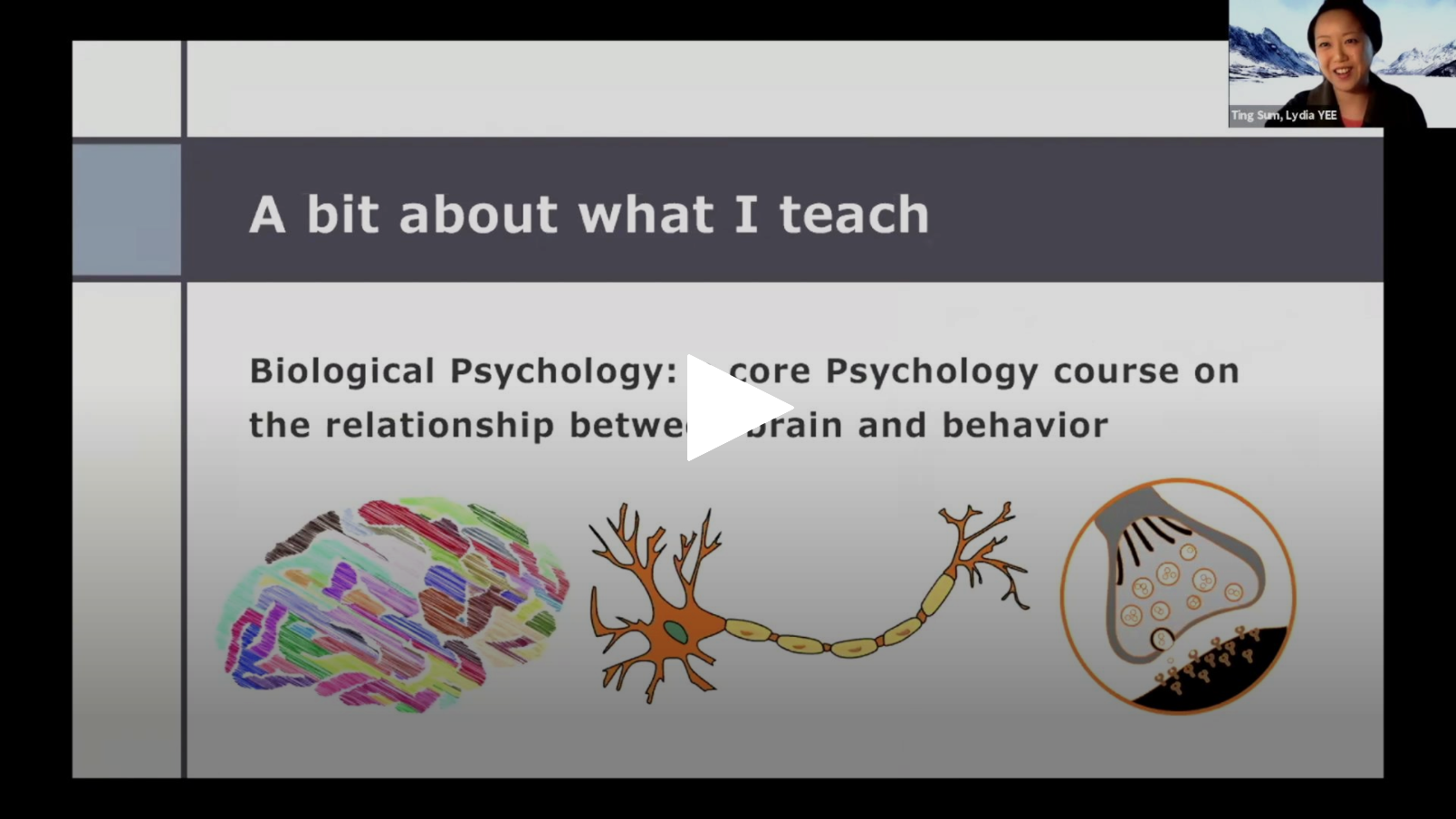Three Considerations in Designing Alternative Assessment:
Sharing by Dr. Lydia Yee
Dr. Lydia Yee has been teaching PSY2001 Biological Psychology, a core psychology course on the relationship between brain and behaviour, for six years. In the transition to adopting alternative assessment, she considered it important to consider the course load and assessment methods for students as they are also navigating a new online learning environment. Dr. Yee suggested three tips for re-designing the course work with consideration of assessment load, class interaction, and authenticity.
Dr. Lydia Yee has been teaching PSY2001 Biological Psychology, a core psychology course on the relationship between the brain and human behaviour, for six years. In the transition to alternative assessment, she felt it important to consider the course load and assessment methods for students, as they are also navigating a new online learning environment. Dr. Yee gave three tips for re-designing course work, which focus on assessment load, class interaction and authenticity.
To even out the assessment load, Dr. Yee pointed out that it is desirable to break assessments into smaller assignments to avoid overwhelming students. During the pandemic, students might be more stressed, as they are no longer in a campus learning environment and need to adapt to many changes in the learning mode. Breaking down major assessments into small assignments may help. These assignments can help students to follow the course more easily, and help instructors keep track of students’ progress and quickly identify and correct students’ misunderstandings. For example, to track students’ progress, Dr. Yee used Edpuzzle, a video app that allows instructors to add quizzes to video clips. Such quizzes allow students to check their understanding. Instructors can easily see the quiz results for the whole class, and based on the class’s performance, they can clarify concepts that students find difficult.
To facilitate class interaction, Dr. Yee connected online assignments with in-class discussions or collaborative work to motivate her students. Students were required to use Padlet to complete small assignments. Padlet allows students to ‘like’ and comment on their classmates’ posts, which enhances class interaction. To connect the assignments with in-class discussions, Dr. Yee chose popular student posts for discussion and posed guiding questions to students. Dr. Yee then used polls and Zoom’s breakout room function to arrange collaborative activities for students. She emphasised that it is necessary to set goals for students to achieve together in their discussions. Hence, she asked her students to summarise their opinions in a Google document and then present the ideas that they came up with to their classmates. After the group presentation, other students were required to provide feedback. To encourage truthful feedback, it was not tied to their classmates’ grades.
With authenticity in mind, Dr. Yee went beyond assigning essays to her students. In the most recent semester, Dr. Yee asked students to design a poster to explain a biological psychology concept to the community. The task required students to use their organisation and communication skills to translate scientific jargon into accessible language. Dr. Yee explained that completing authentic tasks like this sharpens students’ skills in communicating professional knowledge, which are desirable in any profession, even if the students do not go on to become professional psychologists. As many studies have suggested, authenticity not only includes employability, academic integrity and the development of professional skills, but also embraces other elements, such as the application of subject knowledge to the local community (Arnold, 2019; Sambell, McDowell & Montgomery, 2013). Designing authentic assessments for students might open up more opportunities to develop professional and generic skills.
Reference
Arnold, L. (2019). Unlocking the power of authentic assessment. DLTE ARISE lecture, Edinburgh Napier University, Nov 27. Slides and recording available (ENU staff only) at https://staff.napier.ac.uk/services/dlte/Pages/DLTE-Past-Events-201920.aspx, or slides from https://lydiaarnold.wordpress.com/
Sambell, K., McDowell, L., & Montgomery, C. (2013). Assessment for learning in higher education. Routledge.


